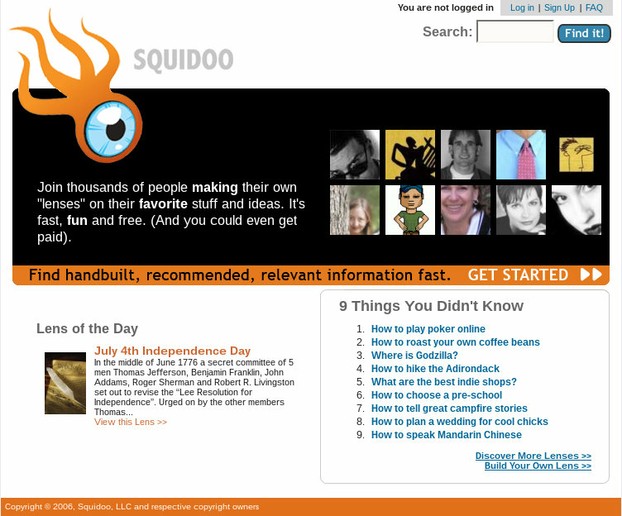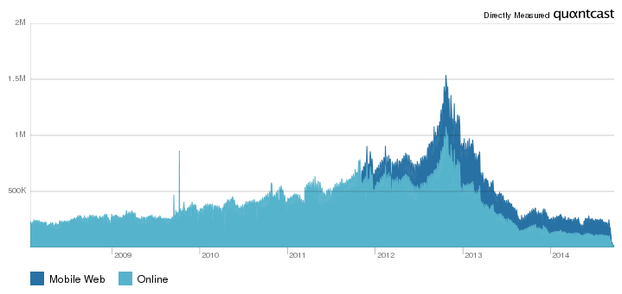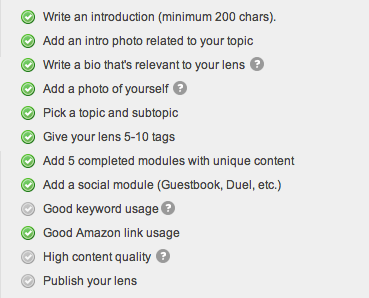Squidoo was a self-publishing website that quickly skyrocketed to being one of the top sites on the web, only to fall into ruin relatively quickly, in a few years. I was very sad to see Squidoo fall, as it was a site I loved, and I think much has been lost both by its fall from prominence and eventual closure.
I was an active publisher on Squidoo during its rise to peak prominence, and through its decline. I saw the demise of the site coming, and stopped publishing on the platform long before it closed. I firmly believe that Squidoo fell from prominence due to specific practices and policies on behalf of the administrators.
Here I outline the history of the site and explain the factors that led to its success as well as its eventual failure and folding. I hope that this page can highlight both the strengths and weaknesses of the site, and be a lesson to future site administrators.
There are also a few historical screenshots for nostalgia's sake!













 The Shaming of Femininity and Elevation of Masculinityon 07/13/2017
The Shaming of Femininity and Elevation of Masculinityon 07/13/2017
 What is Genderqueer or Non-Binary Gender?on 10/16/2015
What is Genderqueer or Non-Binary Gender?on 10/16/2015
 Resources for Learning Spanish Free Onlineon 04/13/2016
Resources for Learning Spanish Free Onlineon 04/13/2016
 Ways Native Plants Can Help Control Invasive Plantson 05/26/2016
Ways Native Plants Can Help Control Invasive Plantson 05/26/2016


Questions? Comments? Feedback?
I arrived at Squidoo some time after it had started, but my opinion is there was a lack of understanding of what the real point was, earning money. I worked hard and eventually got to level 80, along with Giant Squid. Then, they changed the requirements and allowed more Giant Squids, a response to new writers who wanted to start at the top. I had over 300 lenses and was earning close to $300 each month, but I never had more than 2 lenses in tier 1 at a time. Then, one month my earnings dropped. Tier 1 dropped from $60 range to about $6, and lower tiers were hardly worth considering. My feeling is the problem started with the cancellation of the fan club, and limiting internal visits with interaction. Internal traffic helps with ad impressions, and they were eliminating too much internal traffic. Then, only the top 250,000 lenses would be featured causing seasonal lenses to drop and be difficult to recover the next year. And yes, spam was high. One person would write on a topic like pillows, then change the color and repeat, over and over. I also stopped writing about a year before the end, but after some time I got a notice I had to write five lenses in different areas to remain a Giant Squid. Once that went away the filters did damage. I had about 300 lenses transfer to Hubpages, of which I reduced them to about 120, and they still sit there without much traffic. It is so much better here.
It's all been disappointing. None of us writing online can take things for granted. Several sites have gone down the tubes in the past year along with Squidoo. Let's hope Wizzley keeps growing stronger. It's a good site.
Nice article, I like you never cared for that big arrow as if a neon sign to a cheap hotel... Spam like for sure. I have been here at Wizzley for a while and love it, the admin here are top notch and classy. The nuts and bolts of it all are iron clad and well to my liking, it all makes good practical sense. I am sorry to hear about the sell out. I understand how disappointing that must be. It is good to have you here, look forward to reading your work.
I do not know who you were on Squidoo, but this is a well presented summary of what went wrong with Squidoo.
I bailed out in November 2013 - voluntarily. No locks, no sanctions from Squidoo HQ, I had just had enough of jumping through hoops put in my way by people in whom I had lost any faith that they actually knew what they were doing.
Since then I have watched a certain individual, who grovelled and bowed down to the altar of Squidoo, rewrite his own history as he sticks the knife into Squidoo HQ and in particular Bonnie Diczhazy, who he "supported" all the time he appeared to be benefitting from his "support".
This person was totally disrespectful to those of us who questioned what was happening on Squidoo during the latter part of 2012 and through 2013. We were labelled as "negative".
Now he has turned on those he fawned upon and does not have the decency to acknowledge that we were right and apologise for his constant vitriolic comments.
He now wanders around, on various publishing platforms telling us what went wrong with Squidoo, as though he never worked so hard to be Teacher's Pet.
Stone me, give us a break :)
Your summary of what happened is pretty accurate, although we can't know what all went on in the background.
In a longer view, I believe Squidoo went bad because Seth Godin and Megan Casey got drunk on Adsense and Amazon revenue. Megan had more to do with things than Corey and was actually billed as a co-founder with Godin. She once suggested that affiliate revenue was the only real way to make money on Squidoo, pretty much suggesting that writers were wasting their time.
Moreover, she - surely with Godin's blessing - left the gate open for the mob of affiliate marketers that turned Squidoo into a marketing maelstrom where anyone who know how to manipulate an Amazon module, with or without content, had a shot at some dough. The infamous, highly rated (on Squidoo and Google SERPs) shower curtain catalog lens comes to mind.
Finally, Google had enough and stopped sending traffic that wasn't warranted by original content. The erosion started and Megan Casey bugged out, leaving Bonnie Diczhazy to deal with the mess. Bonnie was in over her head, and Godin, who fancies himself a genius, steered clear too.
Diczhazy's leadership took only eighteen months to wreck the site completely. The upshot came when Godin finagled a way to sell content he didn't own to a willing HubPages and Bonnie escaped to a job with, guess who, Megan Casey. Squidoo's admins came out on top, its content creators left with little leverage and less time to figure out how to deal with being ripped off.
I tried to like squidoo about a year and a half ago but it was cunfusing to me. I also thought their page layout was too busy. I'm glad you arrived here. I like your work!
I never could understand Squidoo's payment system. I published one or two things there then removed them within a week and looked for something new.
I have created an account with squidoo, but I think I have published only one article there. Wizzley is much easier use.
Looking forward to reading anything you can post here from Squidoo, MBC.
Well I was with Squidoo for over 7 years so my 300 plus pages and now defunct since I did not go to Hubpages. It's going to take a long while to get my revenue back up to a decent monthly income again.